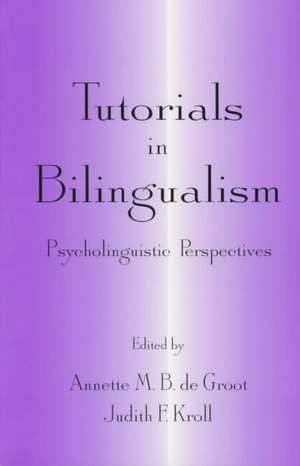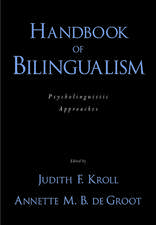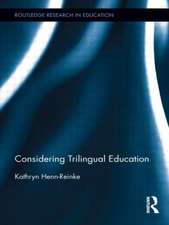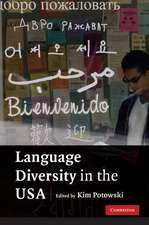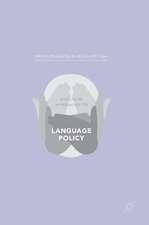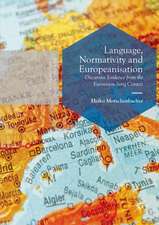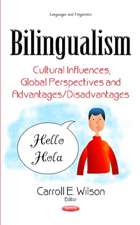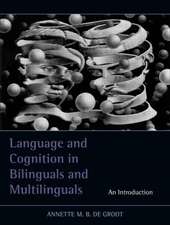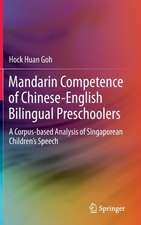Tutorials in Bilingualism: Psycholinguistic Perspectives
Editat de Annette M.B. de Groot, Judith F. Krollen Limba Engleză Paperback – apr 1997
In addition to the growing awareness that bilinguals are very common and may even outnumber monolinguals, there is the dawning understanding that the bilingual mind is not simply the sum of the cognitive processes associated with each of the two monolingual modes, and that the two languages of bilingual may interact with one another in complicated ways. To gain a genuinely universal account of human cognition will therefore require a detailed understanding of language use by both pure monolinguals as well as bilinguals, unbalanced and balanced, and of the representations and processes involved.
These two insights, that bilingualism is a common human condition and that it may influence cognition, were presumably instrumental in putting bilingualism on the agendas of many researchers of cognition and language in recent years. But other reasons may have played a role too: The study of bilingualism also provides a unique opportunity to study the relation between language and thought. A final reason for the growing interest in this area of research is the awareness that bilingualism may confer the benefit of broadening one's scope beyond the limits of one's own country and culture.
This book serves as an excellent introduction to the important topics in the psycholinguistic study of bilingualism. The chapters represent a comprehensive and interrelated set of topics that form the core of contemporary research on the psycholinguistics of bilingualism. The issues raised within this perspective not only increase our understanding of the nature of language and thought in bilinguals but also of the basic nature of the mental architecture that supports the ability to use more than one language.
Preț: 432.06 lei
Preț vechi: 508.32 lei
-15% Nou
Puncte Express: 648
Preț estimativ în valută:
82.67€ • 86.15$ • 68.45£
82.67€ • 86.15$ • 68.45£
Carte tipărită la comandă
Livrare economică 03-17 aprilie
Preluare comenzi: 021 569.72.76
Specificații
ISBN-13: 9780805819519
ISBN-10: 0805819517
Pagini: 380
Dimensiuni: 152 x 229 x 23 mm
Greutate: 0.59 kg
Ediția:1
Editura: Taylor & Francis
Colecția Psychology Press
Locul publicării:Oxford, United Kingdom
ISBN-10: 0805819517
Pagini: 380
Dimensiuni: 152 x 229 x 23 mm
Greutate: 0.59 kg
Ediția:1
Editura: Taylor & Francis
Colecția Psychology Press
Locul publicării:Oxford, United Kingdom
Public țintă
ProfessionalCuprins
Contents: Preface. A.M.B. de Groot, J.F. Kroll, Introduction and Overview. Part I: Second Language Acquisition. B. Harley, W. Wang, The Critical Period Hypothesis: Where Are We Now? N.C. Ellis, N. Laporte, Contexts of Acquisition: Effects of Formal Instruction and Naturalistic Exposure on Second Language Acquisition. N. Segalowitz, Individual Differences in Second Language Acquisition. B. MacWhinney, Second Language Acquisition and the Competition Model. Part II: Representation, Comprehension, and Production in Two Languages. M. Chapnik Smith, How Do Bilinguals Access Lexical Information? J.F. Kroll, A.M.B. de Groot, Lexical and Conceptual Memory in the Bilingual: Mapping Form to Meaning in Two Languages. N. Poulisse, Language Production in Bilinguals. F. Grosjean, Processing Mixed Language: Issues, Findings, and Models. A.Y. Durgunog(u)lu, Bilingual Reading: Its Components, Development, and Other Issues. Part III: The Consequences of Bilingualism for Thought and for Special Forms of Language Processing. V. Cook, The Consequences of Bilingualism for Cognitive Processing. R. Dufour, Sign Language and Bilingualism: Modality Implications for Bilingual Language Representation. M. Paradis, The Cognitive Neuropsychology of Bilingualism.
Recenzii
"...provides the reader with insights into a rich range of research traditions....covers a broad range of issues not usually brought together. The reader is thus provided with a clear introduction to the complexity and controversy surrounding research in this area."
—TESL-EJ
"...the book raises many important issues. It offers an excellent resource, pulling together literature from a variety of areas in a thoughtful way."
—American Scientist
—TESL-EJ
"...the book raises many important issues. It offers an excellent resource, pulling together literature from a variety of areas in a thoughtful way."
—American Scientist
Notă biografică
Annette M.B. de Groot, Judith F. Kroll
Descriere
This volume presents psycholinguistic theory and research on bilingualism, including second language acquisition and bilingual language processing. For cognitive psychologists, theoretical and applied linguists, and psycholinguists.
